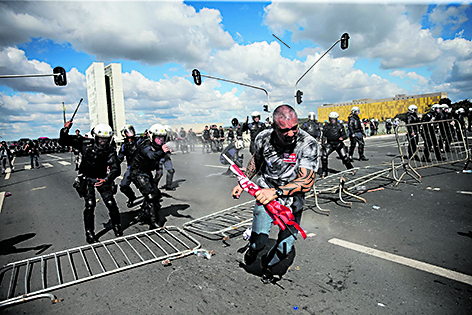Commentary
In the Brazilian crisis, the eye of the Latin storm
Argentina is trembling. Not just because its economy is heavily dependent on Brazil, but because the government of President Macri is facing strong social headwinds.

President Michel Temer backtracked. He revoked the state of emergency and withdrew the army from the streets of Brasilia. But he hasn’t given up his seat, won with an institutional coup against Dilma Rousseff. Therefore, he hasn’t turned off the political and social fire.
There is a risk now of this fire spreading to the whole of Brazil, after the street battles in Brasilia and Rio de Janeiro on Wednesday. “Fora Temer” is the slogan that resonates now in virtually all states of the South American giant. This sign of popular rejection affects not only the president, but, in general, all politicians, perceived as corrupt and inefficient. It reminds of the slogan “Se vayan todos,” booming in Argentina in December 2001, reduced to the pavement by a corrupt political class, at that time represented by justicialista President De la Rúa. Even in the case of Brazil, it is no longer a matter of dismissing the coup president, but the lack of confidence in the entire political system. Much of the population cries out for the direct election of the head of state. In other words, an institutional change.
Temer’s fate appears sealed. The Order of Lawyers of Brazil introduced on Thursday its impeachment request, which was added to the other 16 already submitted to Congress. Since the disclosure of the polemical audio recording in which Temer consents to pay off an arrested former MP, to avoid being mixed up in corruption, the trickle of defections from his staff is turning into a torrent.
But the fire sparked first by the institutional coup, and after by the hyperliberal laws to ‘revitalize’ the economy, and ultimately by Temer’s decision not to step down despite the complaints, is much larger and dangerous.
For this reason, the three presidents — Lula da Silva (Workers Party), Henrique Cardoso (Party of Brazilian Social Democracy) and José Sarney (Party of the Brazilian Democratic Movement) — met to discuss and agree on future actions in the new political landscape. Although they are the leaders of the country’s largest parties, the three leaders will try — these are their expressed intentions — to get out of the strict logic of the party system.
If Temer quits or is removed, the Constitution provides that the president of Congress will assume the presidency for 30 days while Congress elects a president who will serve until the end of 2018. But there is a complication: Nobody under investigation can be appointed. And both the president of the lower house, Rodrigo Maia, and the president of the Senate Eunicio Oliveira — the next in the list — are under investigation for corruption, the huge scandal of “lava jato” which besieges the Brazilian political class. If the prosecutor’s office confirms the charges, these two would not be eligible to lead the government of the country. In this case, it would be up to the President of the Supreme Court, Carmen Lucía, to take the chair until Congress can find a presentable candidate.
Some of the names thrown around are 71-year-old Henrique Meirelle, Minister of Finance and former president of the Central Bank under President Lula, and 71-year-old Nelson Jobin, longtime MDB politician, Temer’s party.
The crisis in Brazil shakes Argentina. Not only because its economy is heavily dependent on its neighbor, but also because the government of President Macri is facing a strong social protest and a confrontation with the unions. But in general, the whole subcontinent, which is running through a dangerous phase of instability, is concerned about the balance in the South American giant.
In Venezuela, the opposition reiterated its refusal to participate in the Constituent Assembly elections and has made clear its preferred path is to try to overthrow the elected government of Nicolás Maduro with violence. In Colombia, the former guerrillas of the FARC launched an alarm about the difficulty to realize the peace agreements and circulates the concern that the country can be used by the United States as a base for armed an intervention in Venezuela.
Originally published at https://ilmanifesto.it/nella-crisi-brasiliana-locchio-del-ciclone-latinoamericano/ on 2017-05-26
